收下这些四、六级写作必背模板,拒绝脑袋空空上考场
2024/11/11
Hey小伙伴们,下半年的四、六级考试临近,外研社全新推出的四、六级备考特辑你get了吗?特辑提供超全口、笔试题型解析和考试技巧推荐,助你高效备考,建议订阅、收藏!

点击【订阅】备考特辑专栏,注意别让它们吃灰啦!

热情不息,备考不停!开考倒计时30天(11月14日)之际,四、六级备考辅导名师大连医科大学高峰副教授的抢分讲座直播惊喜回归,扫码即可预约直播!

双十一期间,
购买外研社官方旗舰店四、六级专区图书,即可享受专属优惠!


备考特辑第四弹——写作篇上线!写作模板和技巧奉上,快更新你的四、六级写作“素材库”!
01
四、六级写作的题型与考试时间相同,不同的是,四级作文要求不少于120词,六级不少于150词。

02
四、六级常考的作文类型包括应用文、议论文、图表类作文,小编为你一一解析!
01

应用文
应用文是四级常考的体裁,包括书信、演讲词、布告、证明、简历、广告等。
常用句式
(1)求职信
开头:
▪ I'd like to apply for the job/post/position advertised in...
▪ Having known that your office needs a(n)..., I hasten to apply for the post.
▪ In answer to your advertisement, I wish to apply for...
▪ I learned from your advertisement that you are in need of a(n)...
▪ I would like you to consider my application for...
结束语:
▪ I shall be much obliged if you will accord me an opportunity for an interview.
▪ I am prepared to be interviewed when you find it convenient.
▪ May I look forward to speaking with you about the position you have available?
▪ I am confident that I would be suitable for the kind of work you are advertising.
▪ I look forward to hearing from you and I do hope I shall have the opportunity of an interview.
(2)投诉信
开头:
▪ I regret to tell you...
▪ I am writing to complain of...
结束语:
▪ I choose to complain to you because I am sure you will be able to have the problem solved.
▪ I'm sorry to give you the trouble, but I'm sure you will be kind enough to put the wrong right.
▪ Hoping that the matter will be dealt with as soon as possible.
▪ I am looking forward to receiving your early reply.
(3)邀请信
开头:
▪ It is with the greatest pleasure that I write to cordially invite you to...
▪ It gives me the greatest pleasure to invite you to...
▪ We should be very grateful if you could...
结束语:
▪ I do hope that you will be able to come.
▪ We should be very pleased if you could honor us with your company.
(4)祝贺信
开头:
▪ It was indeed gratifying to receive the news that...
▪ I would like to extend my warmest congratulations to you.
▪ Please accept our heartfelt congratulations on your...
▪ I heartily offer you my best congratulations on your...
▪ Hearty congratulations and good wishes on this milestone in your life...
结束语:
▪ Wish you every success in your future career.
▪ Best wishes for your continued success.
▪ May the years ahead fulfill all your hopes/dreams.
(5)感谢信
▪ I wish to express my profound appreciation for...
▪ I sincerely appreciate your assistance/concern/consideration...
▪ Many thanks for your kindness/generosity/hospitality...
▪ I am truly grateful to you for...
▪ Please accept my sincere appreciation for...
(6)道歉信
▪ I wish to offer my sincere apologies.
▪ I am awfully sorry I have put you to trouble so much.
▪ I beg your forgiveness for my negligence.
▪ I regret very much to say that...
▪ I was too much embarrassed to find how to ask for your forgiveness.
(7)建议信
▪ I'd like to suggest that...
▪ May I suggest that...?
▪ I would like to make a recommendation that...
▪ I am writing to advise you of...
▪ Please take good consideration of my advice. Thanks.
四级真题练手

参考译文及点评
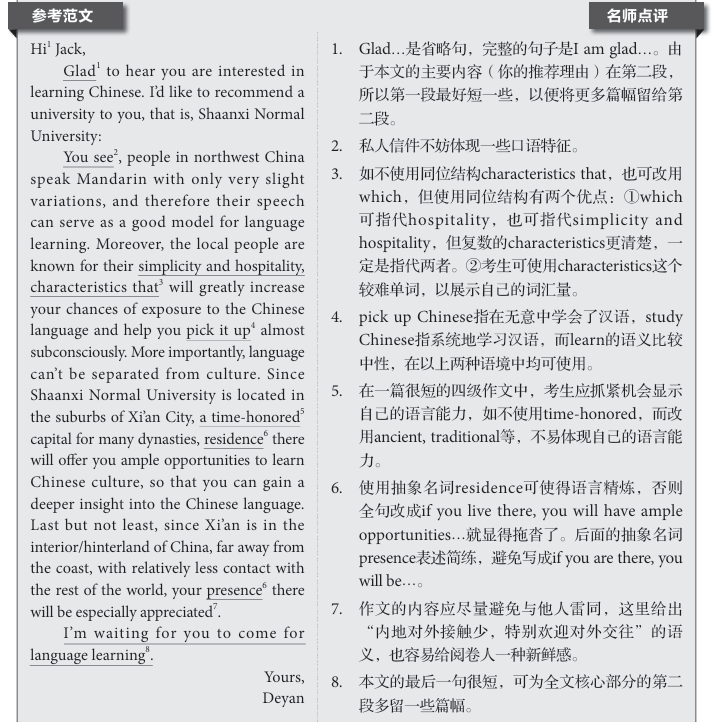
02

议论文
议论文是四、六级都常考的体裁,结构一般为“开头、正文和结尾”三段式,论点、论据和论证方法是议论文的重要组成部分。
常用结构、句式
(1)开头
▪ Contrary to generally (commonly) accepted ideas (views), I argue that…
▪ As opposed to widely held belief that…, I believe that…
▪ Although many people believe that…, I doubt whether the argument can bear much (further) analysis (close examination).
▪ The advantages of B outweigh any benefit we gain from A.
▪ Although it is commonly (widely/generally) accepted (held/agreed) that…, it is unlikely to be true that…
▪ Indeed, there is an element of truth in this argument (statement), but it ignores a deeper and more basic (important/essential) fact that…
▪ It is true that (True/To be sure/ Admittedly)…, but it is unlikely (it won't be the case/it does not mean) that…
▪ The main (obvious/great) problem (flaw/drawback) with (in) this argument (view) is that…
(2)正文
▪ Although it is a popular belief, a current study (survey/investigation) indicates that …
▪ The failure (success/change) in…mainly (partly/largely) results from (arises from)…
▪ As the saying goes,…
▪ What is also worth noticing is that…
▪ One may contribute the increase (decrease/change) to…, but…is not by itself an adequate explanation.
(3)结尾
▪ From what has been discussed above (Tacking into all these factors/Judging from all evidence offered), we may draw the conclusion that…
▪ All the evidence (analysis) supports (confirms/warrants/points to) a(n) unshakable (sound/unmistakable) conclusion that…
▪ There is no immediate (effective) solution (approach/answer/remedy) to the problem of, but might be useful (helpful/beneficial).
▪ It is high time that we place great (special/considerable) emphasis on the improvement (development/promotion) of…
▪ It is necessary (essential/fundamental) that effective (proper) action (measures/steps/remedies) should be taken to prevent the situation.
常用论证方法、句式
(1)比较
▪ The advantages of A are much greater than those of B.
▪ A may be preferable to B, but A suffers from the disadvantages that…
▪ It is reasonable to maintain that…, but it would be foolish to claim that…
▪ For all the disadvantages, it has its compensating advantages.
▪ Like anything else, it has its faults.
(2)原因
▪ A number of factors are accountable for this situation.
▪ The answer to this problem involves many factors.
▪ The phenomenon mainly stems from the fact that…
▪ The factors that contribute to this situation include…
▪ The change in … largely results from the fact that…
(3)结果
▪ It may give rise to a host of problems.
▪ The immediate result it produces is…
▪ It will exercise a profound influence upon…
▪ Its consequence can be so great that…
(4)批驳
▪ It is true that…, but one vital point is being left out.
▪ There is a grain of truth in these statements, but they ignore a more important fact.
▪ Some people say…, but it does not hold water.
▪ Many of us have been under the illusion that…
▪ A close examination would reveal how ridiculous the statement is.
(5)举例
▪ A good case in point is…
▪ As an illustration, we may take…
▪ Such examples might be given easily.
▪ …is often cited as an example.
(6)证明
▪ No one can deny the fact that…
▪ The idea is hardly supported by facts.
▪ Unfortunately, none of the available data shows…
▪ Recent studies indicate that…
▪ There is sufficient evidence to show that…
真题练手
四 级

参考译文及点评

六 级
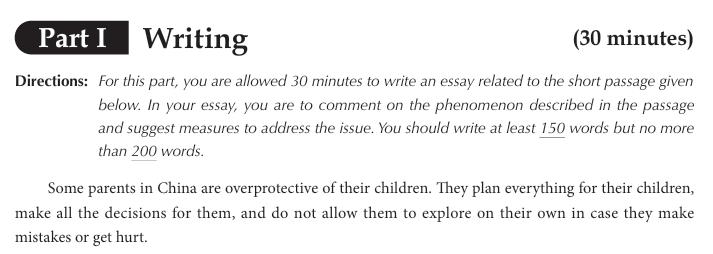
参考译文及点评
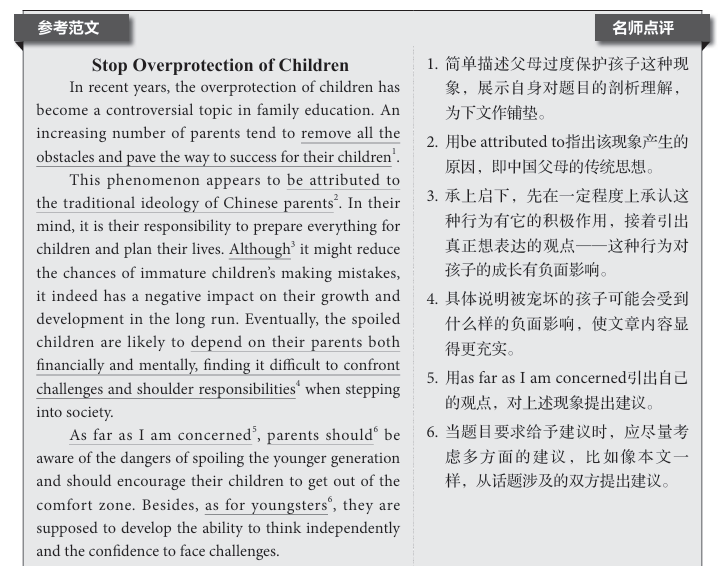
03

图表类作文
图表作文是六级考试常出现的题型,需要在描述图表内容的基础上,分析数据及其背后传达的深意。
常用表达
(1)描述数据变化的动词
▪ 增加:increase/raise/rise/go up...
▪ 减少:decrease/grow down/drop/fall...
▪ 波动:fluctuate/rebound/undulate/wave...
▪ 稳定:remain stable/stabilize/level off...
(2)描述数据变化的形容词和副词
▪ rapid/ rapidly 迅速的/地;飞快的/地;险峻的/地
▪ dramatic/dramatically 戏剧性的/地;生动的/地
▪ significant/significantly 有意义的/意味深长地;重要的/值得注目地
▪ sharp/sharply 锐利的/地;急剧的/地
▪ steep/steeply 急剧升降的/地
▪ steady/steadily 稳固的/地;坚定不移的/变化地
(3)其他在描述中常用到的词组
▪ significant changes 显著的变化
▪ noticeable trend 明显趋势
▪ during the same period 在同一时期
▪ distribute 分布
▪ unequally 不相等地
▪ in the case of 在……的情况下
常用句型
▪ The table shows the changes in the number of... over the period from... to...
该表格描述了在……至……期间……数量的变化。
▪ The bar chart illustrates that...
该柱状图展示了……
▪ The graph provides some interesting data regarding...
该图为我们提供了有关……的有趣数据。
▪ The diagram shows (that)...
该图向我们展示了……
▪ The pie graph depicts (that)...
该圆形图揭示了……
▪ This is a curve graph which describes the trend of...
这个曲线图描述了……的趋势。
▪ The tree diagram reveals how...
该树型图向我们揭示了如何……
▪ The data/ statistics/figures lead us to the conclusion that...
这些数据/资料/数字令我们得出结论……
▪ As is shown/demonstrated/exhibited in the diagram/graph/chart/table...
如图所示……
▪ As can be seen from the diagram, great changes have taken place in...
从图中可以看出,……发生了巨大变化。
六级真题练手
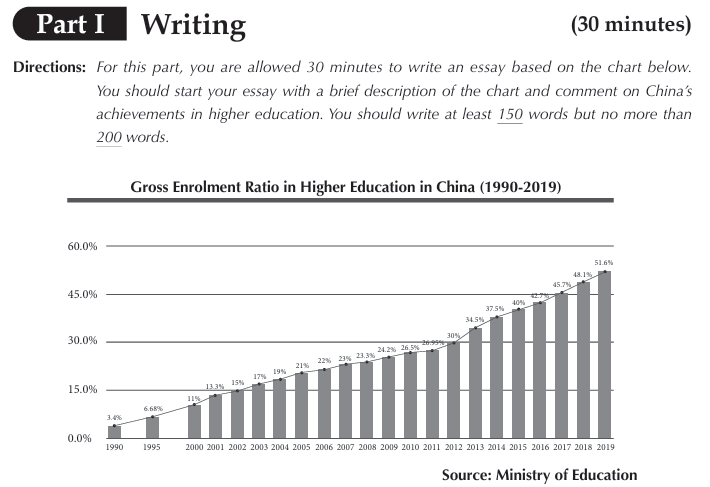
参考译文及点评
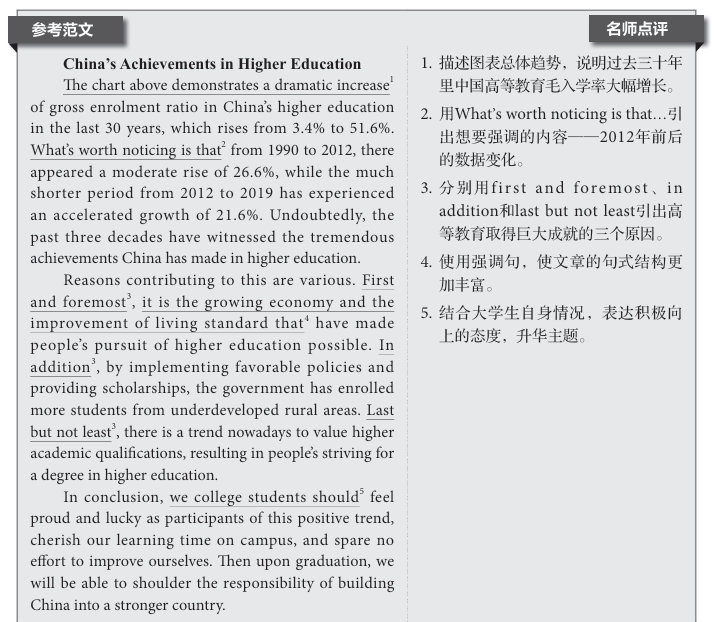
以上干货摘选自《新一代大学英语写作教程》《新世纪实用英语写作(第四版)2023版》《大学英语翻译与写作指导(第二版)》《大学英语写作与翻译实训教程》,真题选自《大学英语四级考试真题全解+标准预测》《大学英语六级考试真题全解+标准预测》。
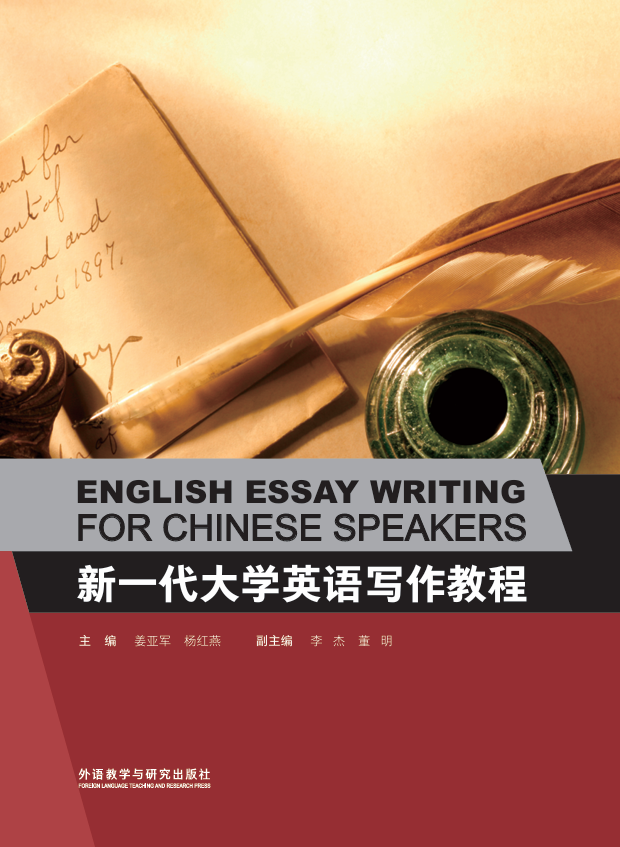
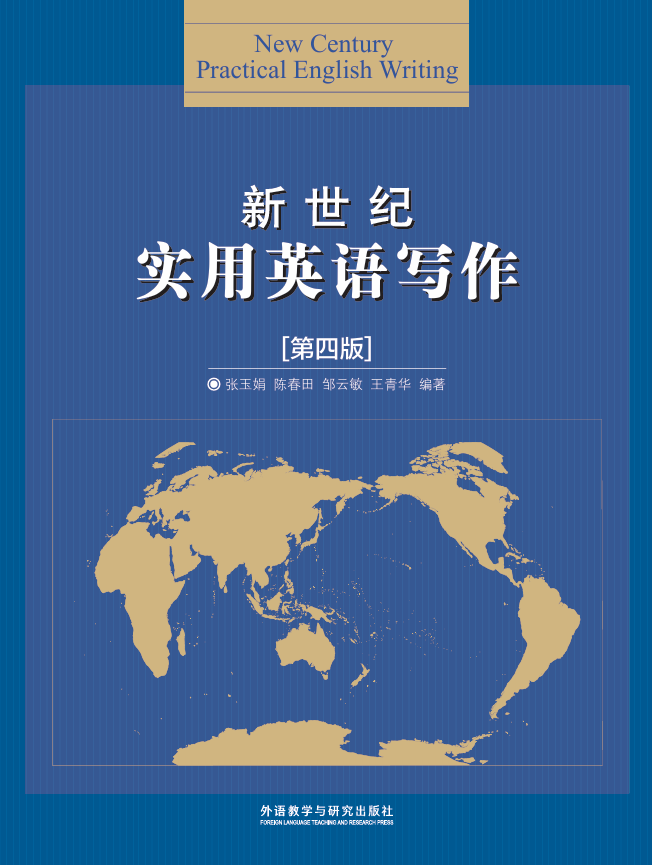
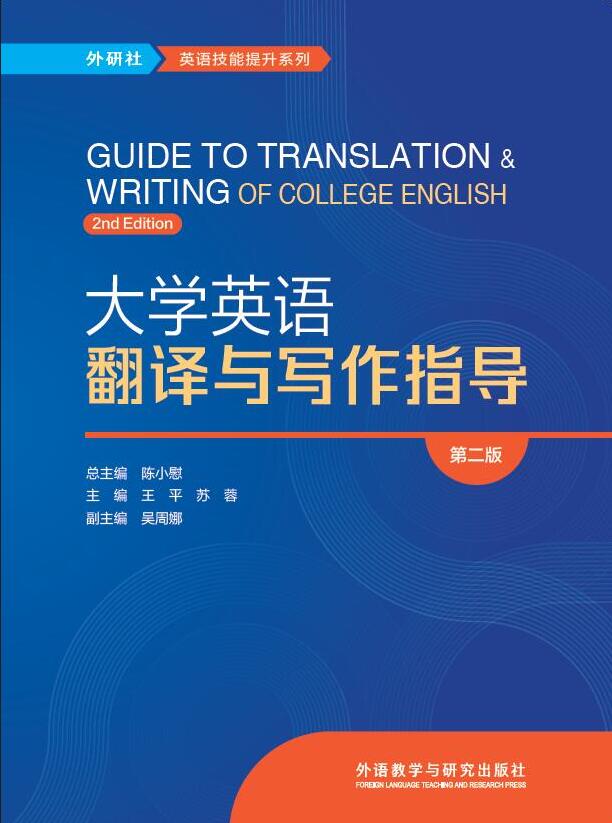



下期将推出热搜常客——四、六级翻译的备考技巧,点击下方订阅专栏即可查看实时查看,高效备考,再也不愁!



